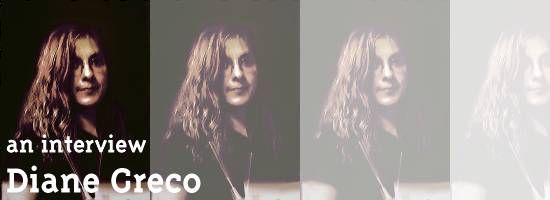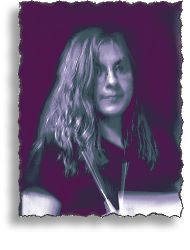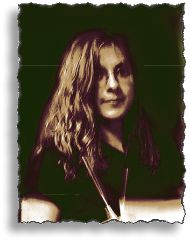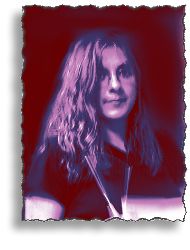![]()

HypertextNOW
-
all issues
- topics
- what's new
Diane Greco recently returned to Eastgate in a greatly expanded role as acquisitions editor after earning her doctorate at MIT. As she unpacked her new computer, Louis, we chatted about the role of the editor in the new media world.
What does a hypertext acquisitions editor DO, anyway?
Mostly what you'd expect from anyone working at the intersection of new media, information technology, and publishing.
I intend to fly my personal helicopter to work, meet with media executives for four-martini lunches, subordinate the populace of a developing nation to the interests of the bottom line, and, most importantly, I will develop a Devious Plan to submit literature to the unstoppable forces of corporate capitalism. From this day forward all novels published in the United States will end in ".com" Think of the possibilities: Middlemarch.com, WaAndPeace.com, Purple_America.com.
I shall certainly run with the scissors.
And then, in my spare time, I'll be working with authors to publish the most interesting and innovative hypertext writing I can find, and developing materials and strategies to promote these works.
What are you looking for?
Well, there are some things that all editors look for that really should go without saying, but always need to be said anyway.
Such as?
 I
would like to see writing that is really the author's best, most finished work.
My pet peeves are errors that show the writer has not devoted herself to learning
about writing in general, as a craft.
I
would like to see writing that is really the author's best, most finished work.
My pet peeves are errors that show the writer has not devoted herself to learning
about writing in general, as a craft.
Professionalism is terribly important. That includes obvious things like making sure the author's name is on everything, making sure there's a cover letter, etc. Workshop your work. Revise.
I was fortunate enough once to speak with Junot Diaz, who advised me to never, never send anything to an editor that you yourself are still not finished with. If you're uncertain about anything, even the position of a comma, then don't send the manuscript; it's not ready.
What about the work itself?
I'm looking for writers who understand the importance of traditional fictional elements--plot, character, theme, place--but who are not so constrained by this understanding that hypertext fails to excite them. I'm eager to see stylistically innovative writing, experimental writing. But stylistic departures and experiments should be motivated in some way; they should be something more than facile imitation of existing experiments for the sake of being fashionable.
 I am also looking for interesting non-fiction. My background is in literature,
history, and science & technology studies, so I am interested in interdisciplinary
approaches to unusual topics like the recent book on -- golly!-- the history of
vibrators in the US from Hopkins, or the recent MIT Press titles on the history
of swimming pools and manhole covers. These are unusual subjects, and lend themselves,
I think, to some interesting, innovative modes of analysis.
I am also looking for interesting non-fiction. My background is in literature,
history, and science & technology studies, so I am interested in interdisciplinary
approaches to unusual topics like the recent book on -- golly!-- the history of
vibrators in the US from Hopkins, or the recent MIT Press titles on the history
of swimming pools and manhole covers. These are unusual subjects, and lend themselves,
I think, to some interesting, innovative modes of analysis.
What's really changed in hypertext publishing since The Old Days?
Which old days were those?
You know, the Golden Age of hypertext fiction.
Oh, you Golden Agers amuse me so much.
You've really put me on the spot here. Yes, it's obviously important to recognize the appearance of early hypertexts as significant events in the history of writing.
But isn't there something profoundly fishy about this golden-age nostalgia? Defining a movement as "over" is often just a way to control the terms of a discourse currently in flux. ( I didn't spend all those years in graduate school for nothing, you know.)
Perhaps this "golden age" is a defensive effort to monumentalize early work. That's something entirely different from recognizing and evaluating their significance. (I don't think we are ready, actually, to begin that evaluation with respect to the whole history of writing, although recognition is certainly not beyond us.) Why this should be the case is a mystery to me. After all, both Michael Joyce and Jane Yellowlees Douglas have had their hypertext work included in the Norton Anthology of Postmodern American Fiction. Not to mention Jim Rosenberg's inclusion in Rothenberg & Joris' 2-volume megalith on 20th century poetry. These are undoubtedly important forms of literary monumentality.
So the golden age isn't really an age?
Possibly you could say the Golden Age is over precisely because hypertext has been "nortonized." I won't say canonized, because I find the academic battles over the word stupid, dishonest and irrelevant. If that's what you mean, then I think this is a very silly reason to send up a big nostalgic lament. I mean, if the Golden Age of hypertext refers to the time when only a hundred people knew about it, well then, yes, that time is over.
But that's good news.
But wasn't it easier to discover something new about hypertext back when hardly anybody was making it?
There is still so much about hypertext that has been unexplored, unarticulated, untheorized. There is so much that we don't understand.
Storyspace offers just one set of aesthetic possibilities. The set is large and interesting, to be sure, and it has been very productive, but there must be others. What can we do with images, with text-as-image, with streaming sound and video? What about telepresence, digital prosthetics as expressive forms, multi-sited yet site-specific work like that of Eduardo Kac?
Can we really speak of a grammar of hypertext, as Deena Larsen has suggested? If so, what are the primitive units of its syntax? Is a link more like a preposition, situating something with respect to something else, or is it more like a gesture of indication, a performance? Or is it something else entirely? Clearly, it is many things...
There is so much to do. Why indulge in nostalgia?
What's your first step?
Getting this machine unpacked, and clearing my desk underneath this mound of rubble.
Keep digging! And then?
Building the hypertext audience, and building community.
 We
need to do a better job of publicizing Eastgate's titles, and of creating opportunities
for bringing readers and writers together. Readings, lectures, and other events.
We
need to do a better job of publicizing Eastgate's titles, and of creating opportunities
for bringing readers and writers together. Readings, lectures, and other events.
There's a lot of energy around hypertext writing and writing for the web right now. We need to harness this, and invite others to participate.
Incidentally, this goal dovetails nicely with the Hypertext Kitchen, a new space with great potential for connecting hypertext people with similar interests and goals, promoting collaborations and synergy.
Also, I'm looking forward to working on the very interesting new titles Eastgate has in the pipeline.

![]()
Diane
Greco has served in several positions at Eastgate. This interview
originally appear upon her appointment as acquisitions editor.
She is the author of Cyborg: Engineering the Body Electric

Eastgate
Fiction Nonfiction
Poetry Hypertext
Storyspace Tinderbox
HypertextNow Order

